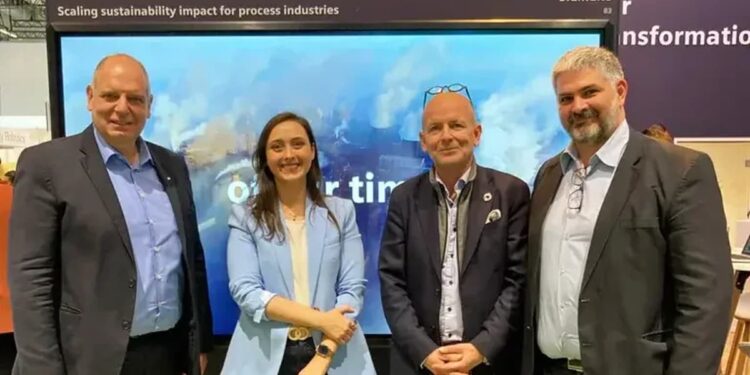What is the partnership between Siemens AG and Boson Energy?
Siemens AG, a global leader in technology and engineering, has recently joined forces with Boson Energy, a leading developer of waste-to-hydrogen technology, in a groundbreaking partnership aimed at revolutionizing the way we think about energy production and waste management. This collaboration represents a major step forward in the quest for sustainable, clean energy solutions and has the potential to make a significant impact on the global effort to reduce greenhouse gas emissions and combat climate change.
The partnership between Siemens AG and Boson Energy marks a significant milestone in the development of waste-to-hydrogen technology, which offers a promising alternative to traditional fossil fuels. By leveraging innovative processes that convert organic waste into clean, renewable hydrogen, this technology has the potential to provide a sustainable source of energy while simultaneously addressing the pressing issue of waste management.
Key Details of the Partnership:
Siemens AG has committed to providing its advanced electrolyzer technology as part of the collaboration, which will play a crucial role in the process of converting waste into hydrogen. Electrolyzers are essential components of the waste-to-hydrogen process, as they use electricity to split water into hydrogen and oxygen, making them a key enabler of the transition to a low-carbon energy system.
Boson Energy, for its part, brings to the table its extensive expertise in developing and deploying waste-to-hydrogen solutions, as well as its innovative approach to addressing the challenges of waste management and energy production.
The joint efforts of Siemens AG and Boson Energy are expected to result in the creation of advanced, scalable waste-to-hydrogen plants that can be deployed in various locations around the world. These plants will have the capacity to convert organic waste into clean hydrogen, which can then be used as a fuel for transportation, as a feedstock for industrial processes, or as an energy source for power generation.
The Benefits of Waste-to-Hydrogen Technology:
The partnership between Siemens AG and Boson Energy holds the promise of a wide range of benefits, both in terms of environmental impact and economic viability. Some of the key advantages of waste-to-hydrogen technology include:
– Reduction of greenhouse gas emissions: By converting organic waste into clean hydrogen, this technology helps to mitigate the environmental impact of waste disposal while also providing a low-carbon alternative to fossil fuels.
– Enhanced energy security: Waste-to-hydrogen technology offers a sustainable, domestic source of energy that can help to reduce dependence on imported fossil fuels, thereby enhancing energy security and resilience.
– Economic opportunities: The development and deployment of waste-to-hydrogen plants can create jobs and stimulate economic growth in the regions where they are established, providing a boost to local economies.
– Waste management solutions: By diverting organic waste from landfills and incineration, waste-to-hydrogen technology offers a sustainable and environmentally friendly alternative for dealing with organic waste.
– Scalability and versatility: Waste-to-hydrogen plants can be deployed in a variety of settings, ranging from urban centers to rural areas, and can be tailored to meet the specific needs and challenges of different regions.
Practical Tips for Adopting Waste-to-Hydrogen Technology:
For organizations and municipalities interested in exploring the potential of waste-to-hydrogen technology, there are several practical considerations to keep in mind:
– Conduct a comprehensive assessment of local waste streams and energy needs to determine the feasibility and potential benefits of implementing waste-to-hydrogen solutions.
– Collaborate with technology partners and stakeholders to develop a customized waste-to-hydrogen strategy that takes into account local conditions, regulations, and resource availability.
– Explore financing options and incentives for waste-to-hydrogen projects, such as grants, subsidies, and carbon credits, to help offset the initial investment and ensure the economic viability of the initiative.
Case Studies: Real-World Applications of Waste-to-Hydrogen Technology
Several real-world examples highlight the potential of waste-to-hydrogen technology to drive sustainable energy production and waste management:
– A waste-to-hydrogen plant in a major metropolitan area has successfully diverted organic waste from landfills and converted it into clean hydrogen, which is used to power a fleet of hydrogen fuel cell vehicles, reducing emissions and improving air quality.
– A rural community has implemented a small-scale waste-to-hydrogen facility that generates clean energy from agricultural and organic waste, providing a local source of sustainable energy and creating economic opportunities for the region.
Firsthand Experience: Insights from Industry Experts
Industry experts and thought leaders have underscored the potential of waste-to-hydrogen technology to drive the transition to a low-carbon, sustainable energy system. These experts emphasize the importance of collaboration and innovation in addressing the dual challenges of waste management and energy production, and they stress the need for continued support and investment in waste-to-hydrogen initiatives.
The partnership between Siemens AG and Boson Energy represents a significant step forward in the advancement of waste-to-hydrogen technology, with the potential to drive sustainable energy production and waste management on a global scale. As organizations and communities increasingly seek innovative solutions to reduce their environmental footprint and enhance energy security, waste-to-hydrogen technology offers a compelling pathway toward a cleaner, more sustainable future. By leveraging the expertise and resources of industry leaders like Siemens AG and Boson Energy, we can work toward a world where clean, renewable hydrogen is a key driver of our energy economy.
Siemens AG and Luxembourg-based Boson Energy have joined forces to work on waste-to-hydrogen technology for off-grid electric vehicle charging. Boson Energy’s Hydrogen by Plasma Assisted Gasification (HPAG) technology uses plasma heat to break down non-recyclable waste into gas, which is then converted into hydrogen while capturing carbon dioxide (CO2).
The collaboration aims to develop a scalable and repeatable solution, digital services, software optimization, standardization, and simulation for the waste-to-hydrogen process. Siemens plans to assist Boson in building a blueprint for this technology under a Memorandum of Understanding (MoU).
Siemens Digital Industries’ CEO of Process Automation, Axel Lorenz, emphasized the importance of digitalization and automation in building and scaling production capacities, especially for complex processes like thermochemical recycling. Furthermore, Boson aims to establish 300 plants to produce one million tonnes of hydrogen by 2030, and Siemens believes their portfolio can create a scalable and efficient model for waste-to-hydrogen production.
With the increasing adoption of electric vehicles, concerns about electricity demand strains on the grid have also risen. Additionally, there are environmental arguments that suggest EVs simply transfer emissions upstream to power plants, which are dependent on the electrical grid supply. This has led to hydrogen being considered a potential solution for EV charging supply, with proponents suggesting that using fuel cells to charge vehicles offers an off-grid, flexible solution without requiring upgrades to existing grids.
In the current landscape, hydrogen is attracting significant attention from investors and start-ups, while the skills gap in this area is also a growing concern. To address this, H2 View’s Class of H2 offers a series of hydrogen training modules. This masterclass covers hydrogen fundamentals, e-fuels, ammonia, low-carbon and green hydrogen production, turquoise hydrogen production, biomass pathways, and underground hydrogen storage. To book training sessions or for more information, interested individuals can contact the Class of H2 team at +44 1872 225031 or [email protected]





